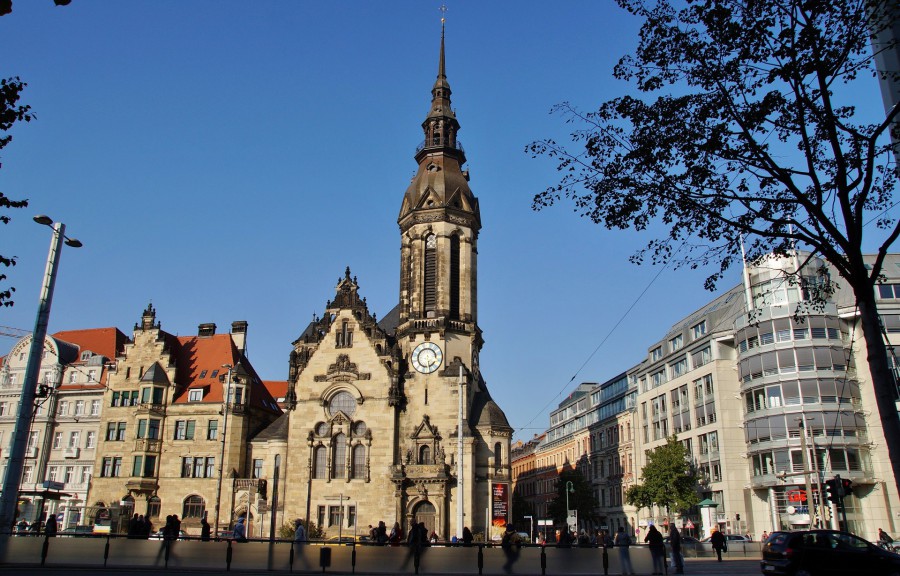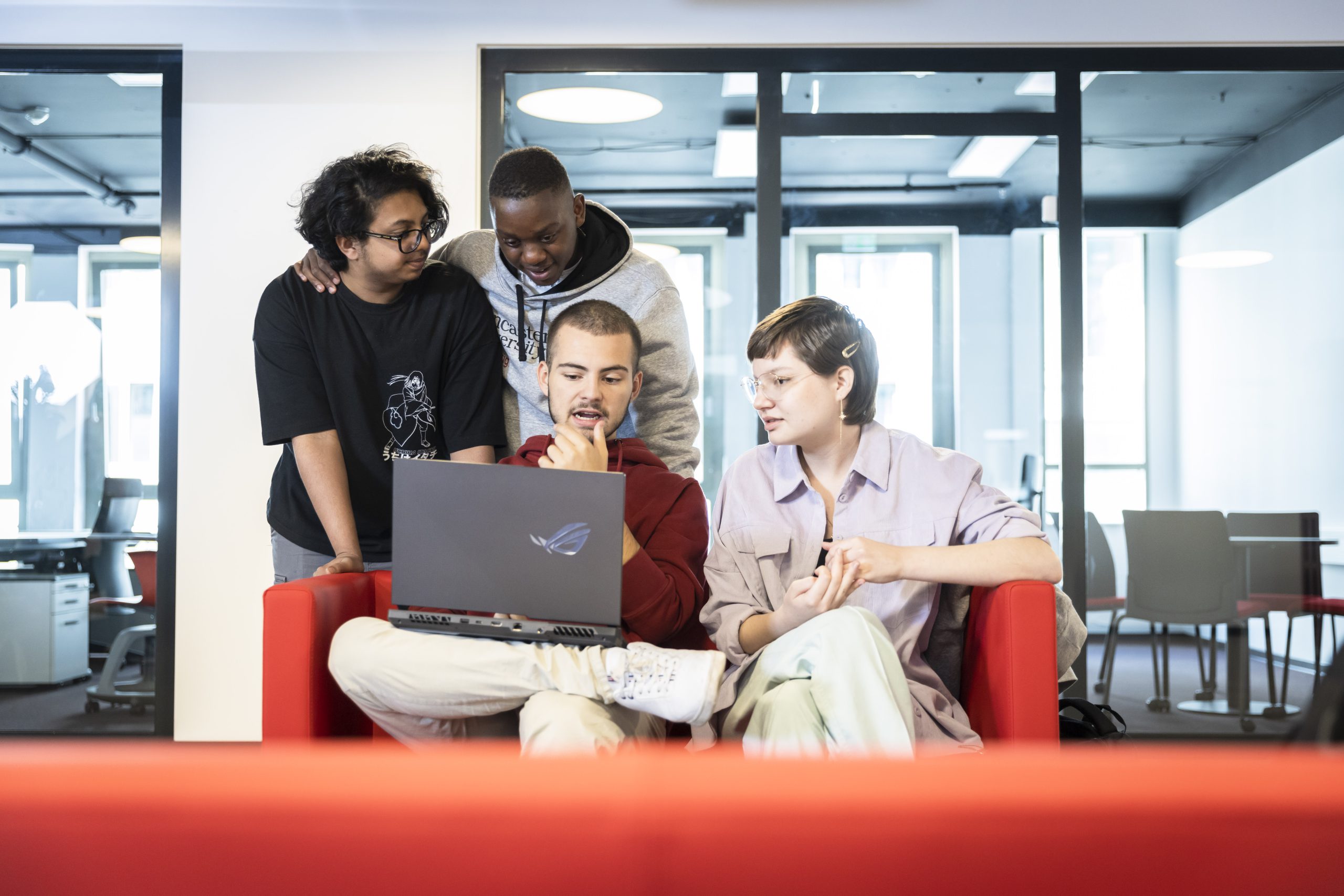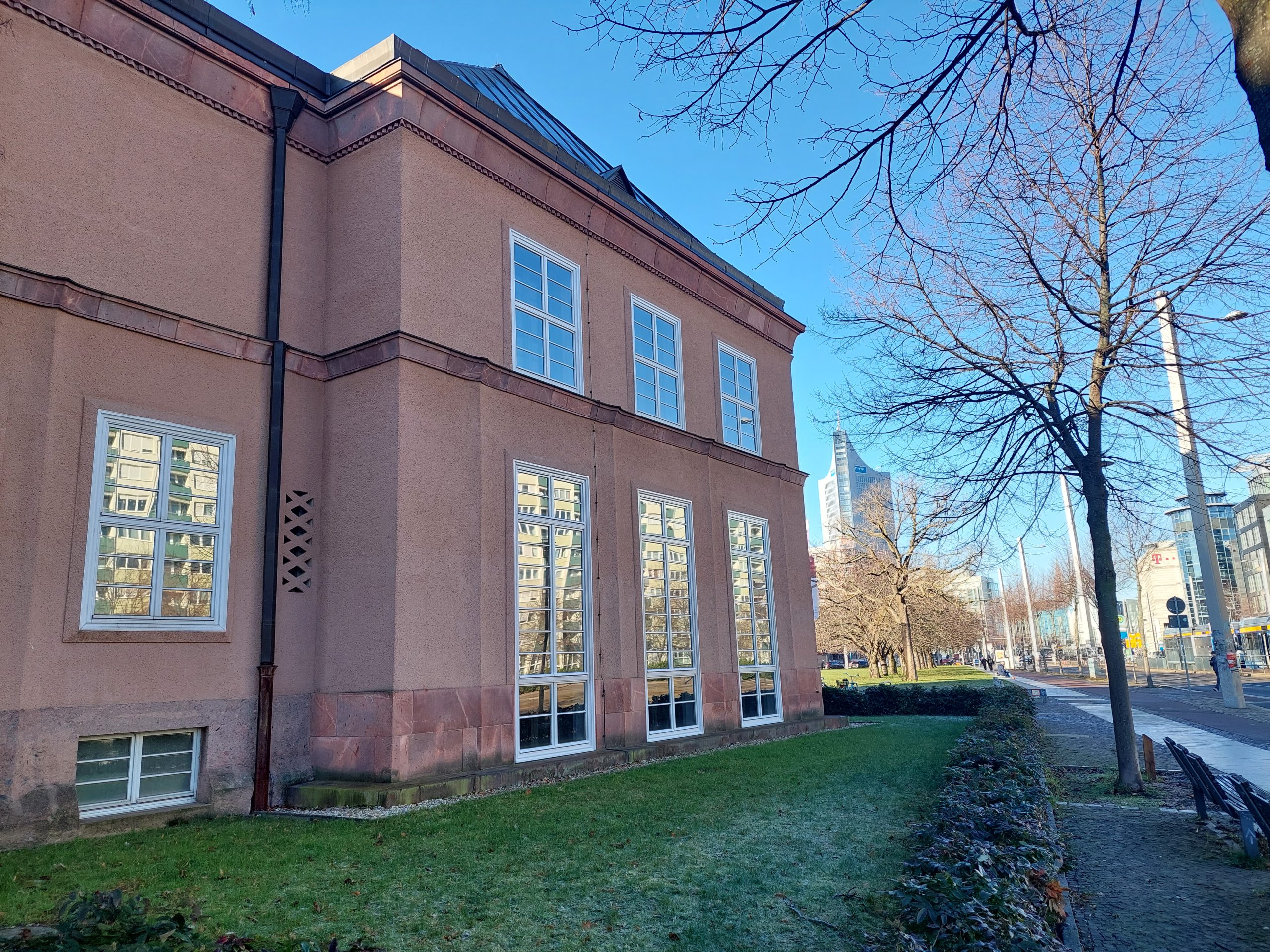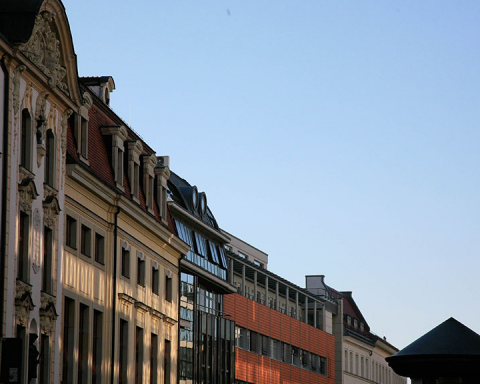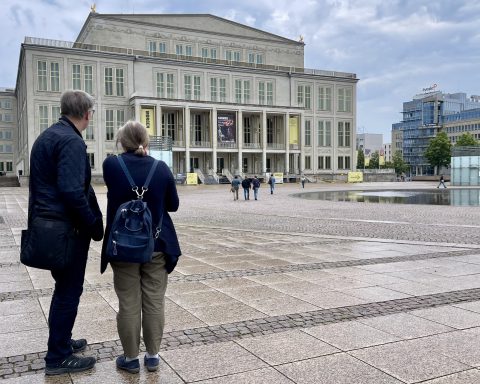“How to Leipzig” – an essential guide in English, by longtime local resident Blossom Foster
Part I: Getting Around
Transport guide
I don’t drive, but here is as much local knowledge of transport systems as I can muster based on my experience.
1. Bikes
The primary way of getting around in Leipzig.
You should assume your bike will get stolen at some point, as all bikes do. So get a good lock, fasten your bike to a pole or solid bike stand when you are out, and keep it indoors when you are home. Plus, make sure your bike is covered on your Hausratversicherung (property insurance) so that they pay for a replacement.
Also, don’t get attached or sink a lot of money into an expensive bike. The bike thieves in this city are true artists, and they prefer really good bikes.
Hand signals are just sticking out the left arm for a left turn and the right arm for a right turn at a 45-degree angle. If you do the American hand signals, people will just think you are riding around saying hi in an idiosyncratic manner.
There’s no signal for stopping, as it is assumed you are watching each other, and no helmet law for grown-ups. Children are required to ride on the pavement/sidewalk up to age 8, between 8 and 10 they can choose, and from age 10 they are supposed to ride in the bike lanes like adults. Schools put all the kids through a bike safety course in Grade 3.
The main danger for bikers is people opening their car doors suddenly into the bike lane, cars in general, out of control dogs, or getting your wheel stuck in the tram tracks. There have been several fatal accidents in the Jahnallee recently, so please just don’t ride there.
Bike lanes are usually reddish or are marked with a picture of a bike. It is not OK to walk in the bike lanes.
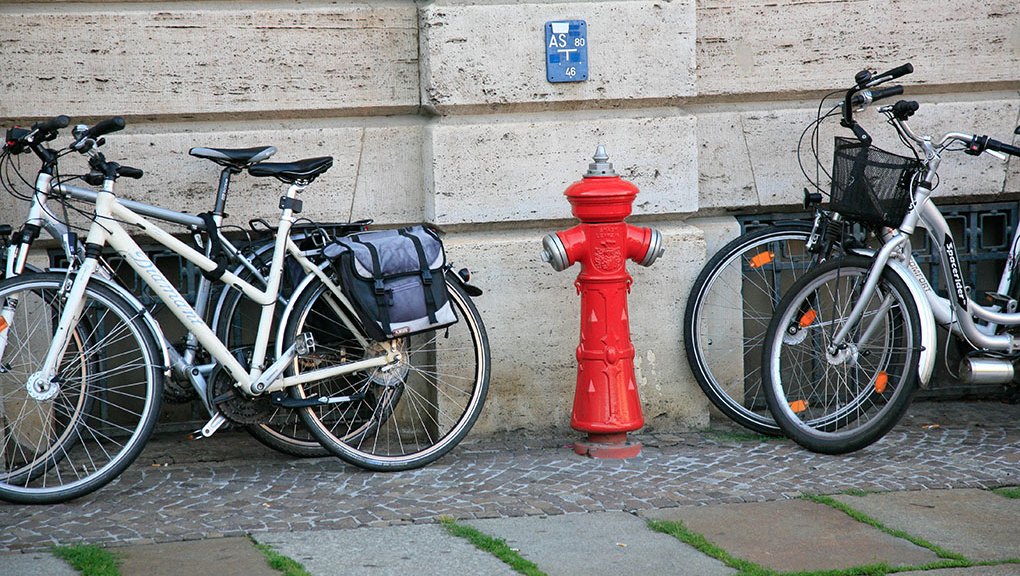
There are numerous booby traps, especially towards the end of the month, in the city center, where people like to sneak through on their bikes although it is a pedestrian zone. If there is a blue sign showing a person with a kid, that means pedestrian zone, and you get fined on the spot if the cops catch you riding your bike there. You can also be fined for riding while drunk, theoretically.
You are a regular part of traffic as a cyclist, so are expected to follow traffic safety laws. In Germany, the rule of right of way is right before left, so at an intersection, whoever is on your right gets to go first. It is immaterial who arrived at the intersection first. It is not considered courteous to let the other person go first anyway. That is just messing up the system for no good reason.
(Editor’s tip: Check out NextBike and Swapfiets for bike rentals, Ebay Kleinanzeigen for used bikes.)
2. Tram & Bus
Leipzig has a large network across the city, including night buses in the wee hours. The trams and buses can be the site of a lot of poor behavior and rudeness, but the rule is “erst raus, dann rein,” meaning you let the people out first before barging in.
You are also supposed to get on the bus at the front and off at the back, but nobody really does that. As everywhere, the area near the doors is reserved for wheelchair users or parents with prams or the otherwise encumbered, so you aren’t supposed to stand around there.
It is OK for kids to ride the trams on their own from about age 8, and you will see whole crowds of school children on the trams between 7 and 8.
The same company (“Leipziger”) runs the buses, trams and S-Bahn or underground system, so the same ticket is valid for all.
This means that if you get off the tram and transfer to the bus, you don’t have to pay again. A full ticket is valid for one hour with unlimited transfers, so if you’re just picking something up, you can go and come on the one ticket.
If you are going up to 4 stops and without transfers, you get a short trip for a reduced price. You can get tickets at numerous tram stops, on the bus or tram itself, online, or using the MDV app (“MOOVME”). Such apps show you the network and timetable and allow you to search for your route.
You need a ticket for your bike if you take it on the tram with you.
If you use public transport several times a week, it is best to get an Abo, or subscription (which is a monthly pass). There are various alternatives for that, so you should get advice from the kiosks at the main station or Wilhelm-Leuschner-Platz. Children ride for free until age 6. There are special Abos for school-aged children. Some Abos can be shared between different people.
If you get caught without a ticket, it is at least a €60 fine, and they are usually mean to you – so at least get the app so you can access tickets whether or not you have change in your pocket. The ticket-checkers usually have dark blue windbreakers and a rectangular kit at their side, about the size of a loaf of bread.
3. S-Bahn
This is the same company as runs the trams and buses, so the same tickets are valid for them and your Abo counts for tram, bus, and S-Bahn. It is basically a metro system but structured to connect outlying villages with Leipzig and Halle. That is what you would normally use if you were taking a day trip to Altenburg or Halle, and is by far the best way to get to the airport.
It can also be the best way to get across town if for, example, I live in Gohlis and want to go to Connewitz – the S-Bahn will be way faster than bike or tram. There are stations dotted through the city, including the one at the Market right in the center. (Note: These days you can just input your destination on Google Maps and it tells you the most efficient routes for Leipzig public transport, too.)
4. Trains
Deutsche Bahn runs the regional and national trains, although there are a few small private companies running regional lines. Their tickets are not valid on the trams and buses, BUT if your train ticket says “City-Ticket,” that means you get a free ride home from the station or from the station to your destination on arrival: If the checkers come, you show them the train ticket.
If you take more than a couple of trips a year, you should get a BahnCard 50, which makes all your tickets half price. Most Germans would consider it basically insane not to have a BahnCard. It costs about €250 for the year, but that can be written off your taxes. There are cheaper rates for students, for trial cards, and for partner cards.
You can also get better ticket prices if you book well in advance. The worst way to get a ticket is from the machine on the day of travel.
The best way is to use their app or website several weeks before. You can take bikes on regional trains (and on the S-Bahn, for free) but not on the ICE. If a train is super crowded, you’re allowed to fill up the first-class seats too (when in doubt, ask an attendant). There are special areas for families, quiet zones, and a restaurant car.
5. Coaches
Everyone already seems to know about Flixbus, and I don’t, so I’ll just park this here.
6. Ride Sharing and Car Sharing
Also something I don’t know about, but the main site is BlaBlaCar, and you can also use mitfahren.de. Lyft and Uber are not really legal here and are not the same as in the US, even when they have that name. There is also TeilAuto (this is a pun suggesting both “part-car” and “sharing-car”), which you can get a membership for and allows you to pick up a car at various points around the city and use it yourself.
Part II: Entertaining Children
Family fun guide
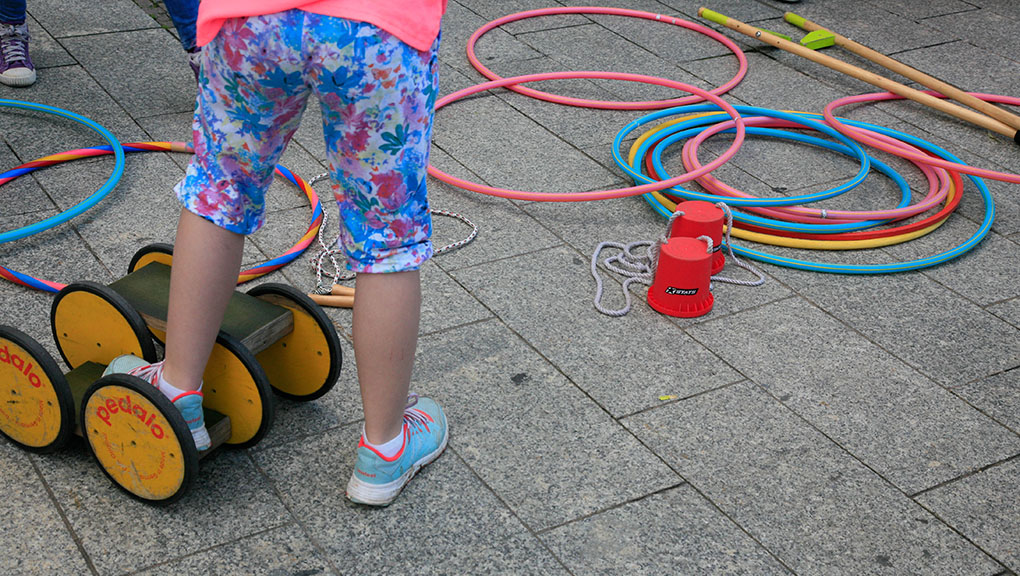
1. Activities for kids on holiday
There is a local institution called the Ferienpass, or holiday pass. It costs €10 or is free if your kid already has a student pass for the trams. You can get it at any of the tram kiosks like at Hauptbanhof or Wilhelm-Leuschner-Platz (Look for the yellow “L”) or in some public facilities like the libraries.
The pass gets your kid FREE travel on the trams and buses throughout the school holidays AND discounted entry to all the bazillion activities listed inside. So it pays for itself within a week or two, plus you find out how to keep your kids busy.
Activities include everything from mini-golf to street dance to excursions to the Panometer to crafts in the museums. There is an enormous amount on offer. You do need to sign up for some things ahead of time, but that is noted in the program. Age range goes from 6 to 16.
You are not supposed to stay with the kids, so it’s also childcare, and most activities would be fine even if your kids are still learning German. The pass is available in both summer and winter holidays.
2. Keeping children active year-round
There are also numerous organizations around town offering arts-based or sport-based activities. If you are not sure which sport your kid would be interested in, look for courses called Sport Carousel. These allow kids to try a sport for a couple of weeks at a time throughout the course and then pick.
For art, I am especially fond of the JuKuWe-Leipzig or KAOS. Riding clubs tend to have waiting lists, and swimming is taught to all kids in second grade.
If you have very small children, you would normally join a “Krabbelgruppe” in your neighborhood. You find out about these by hitting people up on playgrounds or going to mom-and-me classes. The International Women’s Club has one, I believe, and so do many of the midwifes’ practices.
The main playgrounds are in the Johanna Park near the duck pond, and at the southern end of the Clara Park, known as the Abenteuer Spielplatz, and more suitable for kids from about age 6. There is also a popular playground on the southern edge of the Rosental. Lesser-known playgrounds are in the northern side of the Rosental (a Naturspielplatz), and in the Palmengarten park.
A good move for parents of little ones is to get a year’s pass for the Leipzig Zoo and just hang out there on a regular basis. There’s lots to do, several playgrounds, bathrooms and snacks, and no cars.
(Editor’s tip: Leipzig has an amusement park called Belantis and a carnival, the Leipziger Kleinmesse. Adults may also want to have a look at some notable restaurants, cafés, and craft beer bars in Leipzig. And don’t forget to check out the lakes! For events going on in town, LeipGlo has a community-curated calendar.)
Part III: Emergencies
Medical emergency guide
All of the services listed below are included in your regular state insurance. Save the numbers in your phone and be prepared.
BASIC SAFETY PRECAUTION: Learn enough German that you can pronounce the name of your street, give your address, spell your name, and answer basic questions accurately. You cannot expect the dispatchers to speak English.
1. For an immediate emergency
In case of a car accident, major injury, suspected heart attack, not able to walk, can’t move part of your body, serious problems breathing, etc. – call the ambulance on 112.
2. Very ill but not life-threatening AND after-hours
Call the Notarzt, or on-call doctor. They will come to your house. The number is 116117. It can take them an hour or more to come, but they treat you on site. This is whom you call, for example, if you have food poisoning or super high fever and chills, allergic reaction (but not affecting your breathing), or some symptom like dizziness or impaired vision or having fallen on your head, which makes it unsafe or impractical for you to transport yourself to the ER.
If you are in this situation and it is not after-hours, either apply basic first aid and sit tight until the evening OR if the situation is too serious to do that, go ahead and call the ambulance.
I recommend a) keeping a good Hausapotheke or home medical supplies available so you do not get stranded and b) nominating a friend as emergency help if you are in a situation where you shouldn’t be alone but don’t need to be hospitalized or anything.
Germans are, surprisingly, perfectly happy to hand out heavy medication to minors, so if you need your kid to go pick up a prescription and have it filled, that also works.

3. Injury or illness but still able to leave home or be in traffic
Go to the ER/A&E. Follow the signs for Notaufnahme. Every hospital in Leipzig has one, and again, this is included in your insurance. The major hospitals are: UniKlinik in the center, St. Georg in the north, St. Elisabeth in the south, Diakonissenkrankenhaus in the west, and Thonbergklinik in the east. The latter is specialized in accidents more so than illness; but they are small and generally underestimated.
4. For children who have had an accident
Go to the Klinik am Johannisplatz and Dr. Elouahidi in the Kinderchirurgie. If a child is very ill, go to the Kinder und Jugendklinik at the UniKlinik. You’ll be asked whether the accident happened on the way to or from school, just for insurance purposes.
5. Need non-emergency medical attention after hours or on weekends and holidays
Use this link to see which doctors are on-call, and get there first thing. Or google Bereitschaftsdienst Leipzig.
Here is a list of emergency numbers in general, including police, blocking your credit cards, suicide/mental health emergency hotline, domestic violence hotline, etc.
(Editor’s tip: In addition, LeipGlo has a a curated list of doctors who speak English and other languages in Leipzig.)

Part IV: Local Culture
Guide on how to learn about German culture
Oh, you’ve already rejected it and have parked your butt on the struggle bus? No. We can do better.
There is a lot to German culture which you can’t decode just on the basis of day-to-day interactions. If all you know is what you pick up from the lady at the check-out or a bunch of pot heads in Plagwitz (sorry not sorry), then of course you will have an impoverished view of this culture.
Below are recommendations for learning the basics about East Germany in particular, and Germany in general. I promise your experience of Germany will change for the better, profoundly.
Most of all, your job is to observe, not evaluate. Look for patterns rather than passing judgment.
1. Get into the literature
I recommend Christa Wolf, who was a major East German author. Start with Der geteilte Himmel and go from there. Yes, it’s available in English. Also Stephan Hermlin (Abendlicht) and Sarah Kirsch. Franz Fühmann does very beautiful work, as well. You can find a solid list of authors and their primary works here.
Read the stuff that German kids have to read in school, such as the short story Mäusefest by Johannes Bobrowski. Just go to the city library and ask one of the librarians to set you up, or get a parent or teenager to lend you a textbook. This will also profoundly improve your German and, at least in my case, it helped me make friends with the language.
2. Watch DEFA-Filme
These were popular DDR films, often with a certain pedagogical message (just like American Westerns or romcoms also had/have messages about what is important and who is the good guy). They will give you a good idea of the social world people were living in and the ideology that everyone over 50 grew up with. And everyone over 50 is who is making decisions and running institutions here, so don’t sneeze on the olds.
My favorite is The Legend of Paul and Paula, and all the ones with Manfred Krug being the worker-hero.
3. Get your hands on Das Magazin
Das Magazin originated in the DDR and is, I believe, the only magazine from that time that is still kicking. It is truly charming and is available at any newsstand, recognizable based on its compact squarish format and red lettering.
It was famous in the old days for having nude photos, which it still does. Right now you can get the double volume for summer.
4. Participate in crazy German traditions like communally watching TV in pubs on a Sunday night
You go and watch Tatort all together for no good reason, but they really like it.
5. Put in an hour on YouTube listening to Pionierlieder
These were the songs that the DDR version of boy scouts and girl scouts (obvs not separated by sex, because socialism) sang. Even if you don’t understand German, you can catch the spirit of optimism and making the world better, and that might help you to imagine what it meant to people when that all came crashing down.
6. Learn about the Wende (Reunification)
You can start by watching the film Goodbye, Lenin. A better way to learn about it is to talk to old people. The story we got on the news abroad as kids does not reflect the experience of people here. (Politely ignoring all of you characters who were still in diapers then.)
7. Above all, learn German
You will never understand a culture, no matter how long you live in the middle of it, if you don’t speak the language. Get into a class, or at least get started online.
I personally really like the language classes available from the BBC.
Part V: Migration and Integration
Guide for foreigners running into issues
1. Help with the Ausländerbehörde
For those having issues with the immigration office or in need of general support getting settled, go to the Referat für Migration und Integration, located at Otto-Schill-Str. 2 (same as the Bürgeramt).
If immigration is the Joker, the Referat is Batman.
While immigration tries to get rid of people, the Referat tries to solve problems so we can stay. They have resources in numerous languages and their job is to actually support migrants, connecting them with local facilities. This is an important and underused resource. They do not like answering their phone, so I suggest you go in person.
2. Other general advice
Another related resource is Mosaik Leipzig e.V. They provide advice on the process of adjusting here, and they also have mental health services in multiple languages, especially aimed at refugees.
They tend to get a lot of traffic, so it can be hard to get in.
The third major resource – Verband Binationaler – is excellent and effective and also has capacities available to help you deal with issues of getting a visa, securing employment, resolving conflict with landlords or employers, getting into language classes, and so on. Their main advisor is Èanna O’Donnell, who is Irish and speaks both English and German with excellence. Their name suggests their origins in helping bi-national families, but in effect they are now concerned with migrant rights. I know for a fact that they answer their email and are well-qualified.
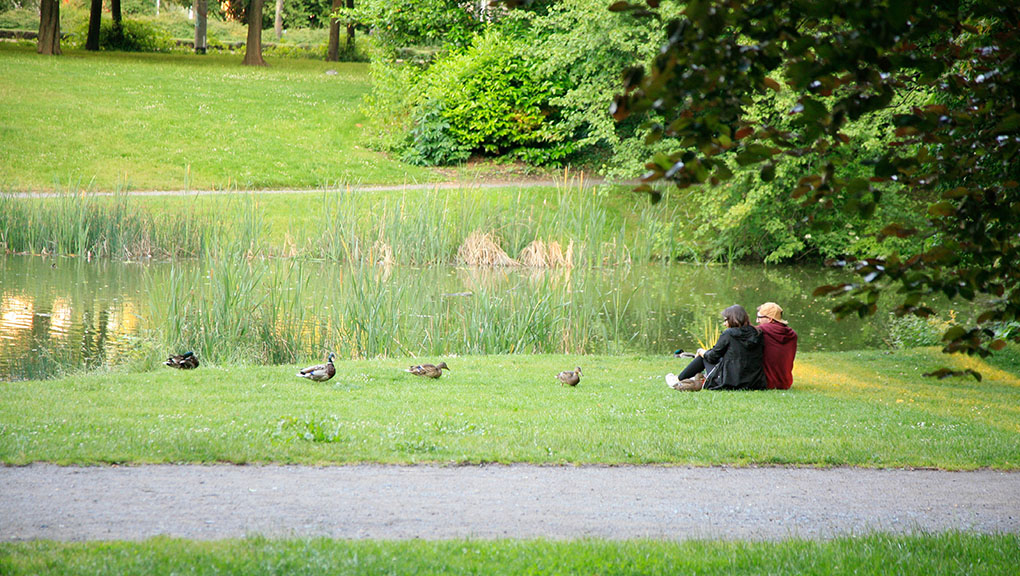
Part VI: Bonus Facts
1. German men are taught to pee sitting down. This is the correct way to pee.
2. German children are taught to rest their left hand on the table next to their plate while eating. Just as Anglo kids are told off with “get your elbows off the table,” German parents say “Hände auf dem Tisch!” It is considered weird and sneaky to put your left hand in your lap while eating.
3. In academic settings, you don’t clap after a lecture or presentation, you knock on the table. Even in an auditorium, as long as the seats are made of wood or there is something wooden in reach, people will knock on the back of the other seat rather than clap.
4. When you join a group of people, you’re supposed to go around to each, shake hands, and say your name – first name in private life, last name in public life. The other person says their name back, and nothing else, then you keep moving. It would be rude to just introduce yourself to a few people and start talking to them. You’re supposed to make the whole round. If there is a biggish group at the table already, you can knock on the table rather than shaking hands with everybody, and say your names, but that is very country manners.
5. When it is the new year, and you see somebody again for the first time that year, you are supposed to shake hands and say “Frohes Neues,” or “Frohes Neues Jahr!” This wears off by the end of January for sure, but starts to be silly after about the 15th.
6. When somebody is particularly nice to you or helps you out, where in some circumstances and countries you would tip or make friends with them, here you would shake hands and say thank you. I did this on a recent trip to Tübingen when somebody went out of their way to help me find the right bus.
7. Tipping is not tipping. When at a hairdresser or riding in a taxi, it’s customary to round up the price stated by about €2, regardless of what you spent. So if I got a bill for €19.50, I would pay €21, maybe €22. Or let’s say it was €18.50 and I want to pay €20; then I hand over a €20 bill and say, “das stimmt so.” If I have a larger bill, say a €50, I hand it over and name the amount I want to pay – “Zwanzig, bitte” – NOT the amount I want back. If you pay by card, you just put a coin on the counter as well.
You do not tip at the bakery, cleaners, repairmen, or people who help you with your bags. Equality is a big value in German culture, so tipping in those contexts could seem grandiose and offensive.
(Editor’s note: In local restaurants and bars, the custom now is to tip 8-10% of the total bill, according to someone currently working in the Leipzig gastronomy business.)
8. When German children start school, there is a giant party, like a Bar Mitzvah for a six-year-old, where all the relatives and neighbors turn out and give presents. All Germans have a photo of themselves with a giant cone-shaped thingy called a Zuckertüte, which is filled with presents and sweets on their first day of school. In mid-August, you will see groups of people out in their good clothes with a bunch of excited children. This is what is going on, the Einschulungsfeier. If you are invited to an Einschulungsfeier, you wear your good clothes, buy a present for the kid, and get ready for an eight-hour thing.
9. When do you use Sie and when do you use Du? When is it proper to say Wie geh’ts dir? And when would you say Wie geht es Ihnen?
The difference is NOT about status or familiarity or formality. It is about social distance. And social distance is really important to Germans. If you do it wrong, it’s like calling your professor bubba. Just weird and inappropriate.
When you can use DU: If the person is around your age or younger, and it is an informal situation.
Asking a guy in the park for a light? DU (stop smoking though, it’s gross). Asking the next table if you can take their chairs and they are a group 40 or under? DU. Your classmates and obviously your family: DU. People who say Du to you? Definitely DU unless you are a small child.
There are also general Du zones, such as yoga classes, sports teams, parties, and some services who are pretending to be cool will address customers as Du even though money is changing hands and it’s kind of tacky: hairdressers and beauticians and some clothing shops. Du means: we are buddies and we are hanging out casually.
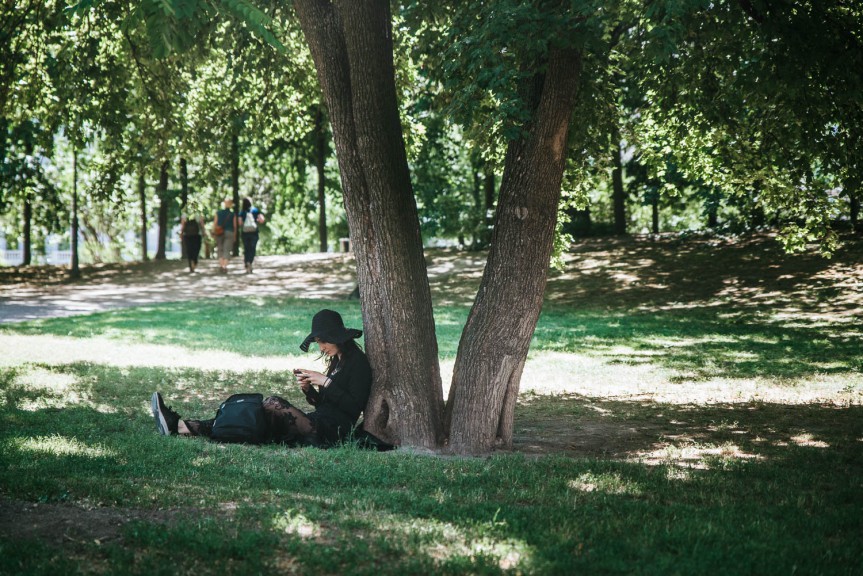
Can you piss people off by NOT calling them Du? My neighbor is maybe 2 years younger than me if he’s younger at all, and he calls me Sie and it is obnoxious because it suggests a big age difference and a desire for social distance even though he almost burnt the house down once and I saved his ass by banging on the door and waking him up. It marks him as an uptight guy.
When to use SIE: strangers who are older than you or with whom you are interacting in a formal or purely functional capacity.
The lady at the checkout in the grocery store, elderly neighbors, instructors, bus drivers, your kid’s teachers, your doctor, waiters, and anyone in any of these categories who has not invited you to use Du. I had a guest address the lady serving her in the bakery as Du and almost fell through the floor in chagrin.
Remember, this is not about status or respect. I address my cleaning lady as Sie, even though she’s been working for me for six years and I was there for her when her son died and we have seen battle together and we like each other. She is over 60 and money changes hands, so we will use Sie forever. It would be inappropriate to offer her to say Du, because it muddies the relationship, acting like it is more familial or casual than it is. It would just make her uncomfortable and be weird, like if you started hugging your postman.
If you do not say Du automatically and there is a transition from Sie to Du, as for example might happen with older colleagues, the older or more senior person is supposed to offer, and you basically have to say yes.
If you want to say no, you have to pretend to go deaf and just continue the conversation on another topic, using Sie. If it is cool, then you shake hands and say your first names. Normally the offer is made using the phrase ‘Wir können uns auch duzen, oder?’ and then you stick out your hand and say your name. This means the person wants to be buddies, but not really. It just puts a little sparkle of chumminess on your relationship. They will never call you or hang out with you or get coffee with you. It doesn’t commit you to anything.
You do need to keep straight which colleagues or neighbors you use Du with and which Sie, because switching back and forth is a faux pas.
80% of the time people go into one category or the other and stay there. I will say Du to the friendly family from upstairs who are a little younger than me forever, and I will say Sie to the old ladies in my building forever. There’s not always a progression and needn’t be.
A version of this guide was originally published by Blossom Foster in the very active and helpful Facebook group Leipzig Expats | InterNational Community.

